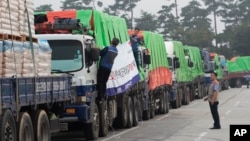South Korea said Thursday that it would temporarily suspend aid to North Korea and limit inter-Korean exchanges in response to Pyongyang’s nuclear test this week.
A South Korean Unification Ministry official who asked to remain anonymous told reporters that the latest nuclear test was a “grave measure” that had harmed peace on the Korean Peninsula and stability in the region.
The official also said that to ensure the safety of its citizens, the government would limit South Koreans’ entry to the Kaesong Industrial Complex, where about 50,000 North Koreans are working at about 120 factories run by South Korean companies. The government will allow only South Korean businessmen and workers directly involved in the operation of the factories to cross the Korean border, according to the official.
This was the second time that South Korea imposed partial restrictions on its citizens’ entry to the complex. In 2013, Seoul took a similar measure after Pyongyang conducted its third nuclear test.
Seoul turns to propaganda broadcasts
In a related move, South Korea resumed loudspeaker propaganda broadcasts across the demilitarized zone (DMZ) at noon Friday.
Cho Tae-yong, a senior presidential national security official, told reporters that Pyongyang’s nuclear test was a violation of the August 25 agreement, a reference to an inter-Korean deal that calls for easing tensions on the Korean Peninsula and promoting dialogue and exchanges between the Koreas.
“North Korea’s fourth nuclear test is in direct violation of its commitments and responsibilities to the international community, such as multiple U.N. Security Council resolutions,” Cho said.
Psychological warfare
The propaganda broadcasts run by the South Korean military are a key part of the South Korean psychological warfare against North Korea. The South Korean military runs about a dozen facilities scattered near the DMZ, with each facility equipped with a bank of 48 loudspeakers. The broadcasts are aimed at North Korean soldiers deployed on the border.
According to South Korea’s Defense Ministry, the broadcasts can reach the intended target about 20 kilometers away during the night. The South Korean military plans to run several advanced mobile loudspeakers capable of reaching farther than conventional loudspeakers.
Cheong Seong-chang, director of unification strategy at the Sejong Institute in Seoul, said Pyongyang was likely to protest Seoul’s move strongly, with possible military provocations. Cho said the military was maintaining readiness against Pyongyang’s provocations, adding it would respond to such events firmly.
North Korea announced Wednesday that it had successfully tested a miniaturized hydrogen bomb, drawing widespread condemnation from the international community.
Jee Abbey Lee contributed to this report.




